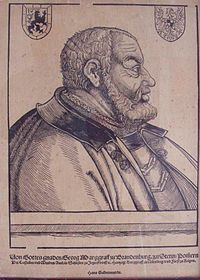George, Margrave of Brandenburg-Ansbach
| George the Pious | |
|---|---|
| Margrave of Brandenburg-Ansbach | |
 |
|
| Margrave of Ansbach | |
| Reign | 1536–1543 |
| Predecessor | Frederick I |
| Successor | George Frederick |
| Born |
4 March 1484 Ansbach |
| Died | 27 December 1543 (aged 59) Ansbach |
| Spouse |
Beatrice de Frangepan Hedwig of Münsterberg-Oels Emilie of Saxony |
| Issue |
Anna Maria, Duchess of Württemberg Sophie, Duchess of Legnica Barbara Dorothy Catherine, Burgravine of Meissen George Frederick, Margrave of Brandenburg-Ansbach |
| House | House of Hohenzollern |
| Father | Frederick I, Margrave of Brandenburg-Ansbach |
| Mother | Sophia of Poland |
Anna Maria, Duchess of Württemberg
George of Brandenburg-Ansbach (German: Georg or Jürgen der Fromme) (4 March 1484 – 27 December 1543), known as George the Pious, was a Margrave of Brandenburg-Ansbach from the House of Hohenzollern.
He was born in Ansbach, the third of eight sons of Margrave Frederick the Elder and his wife Sophia of Poland, daughter of Casimir IV of Poland and Elisabeth of Habsburg. Through his mother, he was related to the royal court in Buda. He entered the service of his uncle, King Vladislaus II of Bohemia and Hungary, living at his court from 1506. The king received him as an adopted son, entrusted him in 1515 with the Duchy of Oppeln, and in 1516 made him member of the tutelary government instituted for Hungary, and tutor of his son Louis II of Hungary and Bohemia. In 1521 he made an arrangement with Petar Keglević and pulled back from Hungary and Croatia; this arrangement, accepted by Louis II in 1526, was not accepted by Holy Roman Emperor Ferdinand I until 1559.
At the court of Hungary there were two parties arrayed against each other: the Magyar party under the leadership of Zápolyas and the German party under the leadership of George of Brandenburg, whose authority was increased by the acquisition of the duchies of Ratibor and Oppeln by hereditary treaties with their respective dukes and of the territories of Oderberg, Beuthen, and Tarnowitz as pledges from the king of Bohemia, who could not redeem his debts.
...
Wikipedia
